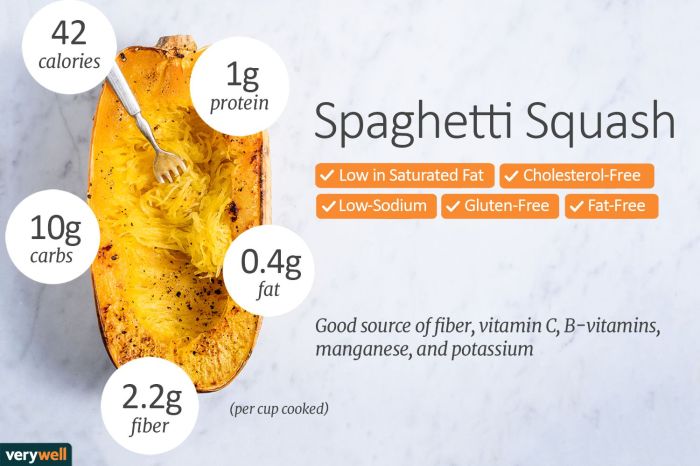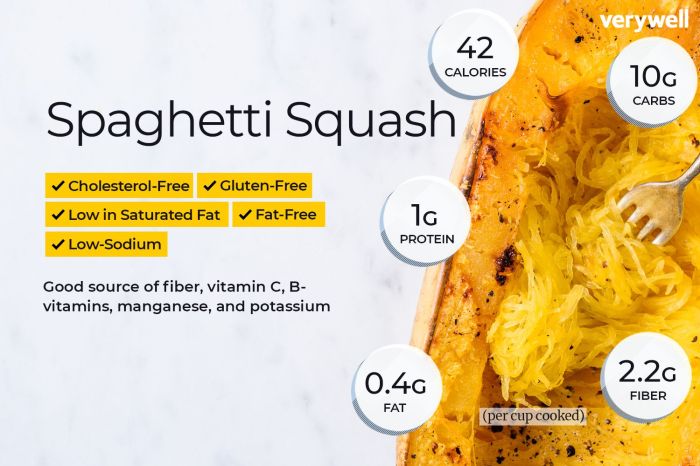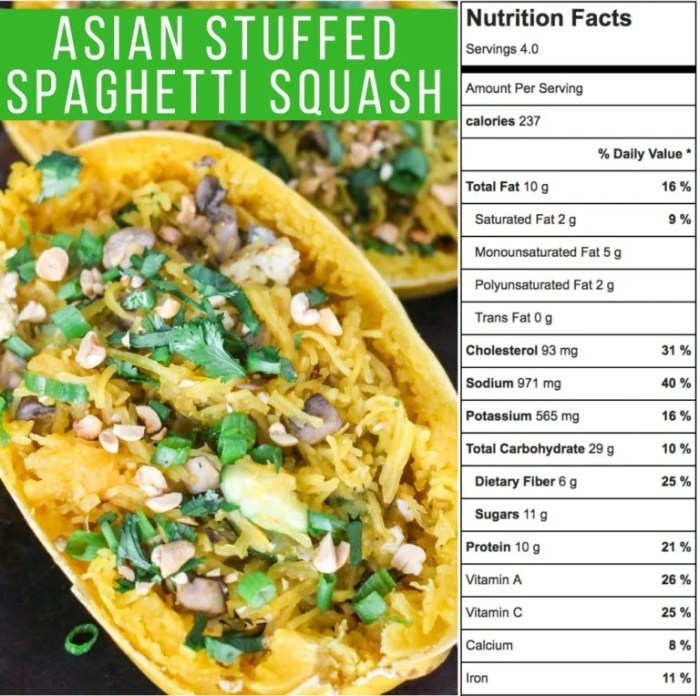Nutritional Profile of Spaghetti Squash

Spaghetti squash nutrition facts – Spaghetti squash, a member of the Cucurbitaceae family, offers a unique combination of nutritional benefits, making it a popular choice among health-conscious individuals. Its mild flavor and stringy texture, resembling spaghetti, contribute to its versatility in culinary applications. This section details the comprehensive nutritional profile of spaghetti squash, comparing it to other popular winter squash varieties.
Macronutrient Composition of Spaghetti Squash
The macronutrient content of spaghetti squash provides valuable insights into its role in a balanced diet. The following table presents a detailed breakdown of carbohydrates, protein, and fat per serving (approximately 1 cup cooked), highlighting the percentage of daily value (%DV) based on a 2,000-calorie diet. Note that %DV values may vary slightly depending on the specific serving size and the nutritional database used.
| Nutrient | Amount per Serving | % Daily Value | Unit |
|---|---|---|---|
| Carbohydrates | 10g | 4% | grams |
| Protein | 2g | 4% | grams |
| Fat | 0.2g | 0% | grams |
Micronutrient Content of Spaghetti Squash, Spaghetti squash nutrition facts
Beyond macronutrients, spaghetti squash is a valuable source of several essential vitamins and minerals. These micronutrients play crucial roles in various bodily functions, contributing to overall health and well-being.
Spaghetti squash is particularly rich in:
- Vitamin A: Essential for vision, immune function, and cell growth.
- Vitamin C: A powerful antioxidant that supports the immune system and collagen production.
- Vitamin K: Important for blood clotting and bone health.
- Potassium: A crucial electrolyte that helps regulate blood pressure and muscle function.
- Manganese: Involved in bone formation, wound healing, and metabolism.
Comparative Nutritional Analysis of Winter Squash Varieties
Comparing the nutritional profile of spaghetti squash to other popular winter squash varieties, such as butternut and acorn squash, allows for a more comprehensive understanding of their relative nutritional value. The following table highlights key nutritional differences per 1 cup cooked serving. Note that values may vary depending on the specific variety and growing conditions.
| Nutrient | Spaghetti Squash | Butternut Squash | Acorn Squash |
|---|---|---|---|
| Carbohydrates (grams) | 10 | 12 | 15 |
| Fiber (grams) | 2 | 3 | 3 |
| Vitamin A (IU) | 1000 | 2000 | 1500 |
| Vitamin C (mg) | 10 | 20 | 15 |
| Potassium (mg) | 400 | 500 | 450 |
Health Benefits of Spaghetti Squash Consumption

Spaghetti squash offers a range of health benefits stemming from its rich nutritional profile. Its vitamin and mineral content contributes to various bodily functions, while its high fiber and low glycemic index impact digestive and metabolic health. The following sections detail these advantages.
Improved Immune Function and Eye Health
The presence of vitamins A and C in spaghetti squash significantly contributes to immune system support. Vitamin A, specifically in the form of beta-carotene, acts as a powerful antioxidant, protecting cells from damage caused by free radicals. This protection strengthens the immune response, reducing vulnerability to infections. Vitamin C further enhances immune function by stimulating the production of white blood cells, crucial components of the body’s defense mechanism.
Spaghetti squash offers a nutritional profile rich in vitamins and fiber, providing a low-calorie alternative to traditional pasta. A balanced meal incorporating spaghetti squash might also include lean protein sources, such as the ground beef detailed in this comprehensive nutritional analysis: ground beef nutrition facts. However, the overall dietary impact depends significantly on preparation methods and portion control, making spaghetti squash a versatile and adaptable component of a healthy diet.
Furthermore, the presence of lutein and zeaxanthin, carotenoids also found in spaghetti squash, supports eye health by protecting the retina from oxidative stress and reducing the risk of age-related macular degeneration and cataracts. These nutrients work synergistically to promote overall well-being.
The Role of Fiber in Digestive Health
Spaghetti squash is an excellent source of dietary fiber, a crucial component for a healthy digestive system. Fiber adds bulk to the stool, promoting regular bowel movements and preventing constipation. This bulk also helps to maintain a healthy gut microbiome, the complex community of bacteria in the intestines that plays a vital role in digestion, immunity, and overall health.
Insoluble fiber, abundant in spaghetti squash, adds bulk to the stool, while soluble fiber helps to regulate blood sugar levels and lower cholesterol. The combined effect of these fibers contributes to a well-functioning digestive tract, reducing the risk of digestive disorders.
Impact of Low Glycemic Index on Blood Sugar Management
Spaghetti squash possesses a low glycemic index (GI), meaning it causes a slow and gradual rise in blood glucose levels after consumption. This characteristic is particularly beneficial for individuals managing diabetes or those seeking to maintain stable blood sugar levels. Unlike high-GI foods that trigger a rapid spike in blood sugar, spaghetti squash provides sustained energy without the subsequent crash.
This slow release of glucose prevents sudden fluctuations in blood sugar, reducing the risk of insulin resistance and associated health problems. The fiber content further contributes to this effect by slowing down the absorption of sugar into the bloodstream. This makes spaghetti squash a suitable carbohydrate source for individuals focused on blood sugar control.
Potential Drawbacks and Considerations: Spaghetti Squash Nutrition Facts

While spaghetti squash offers numerous nutritional benefits, potential drawbacks and considerations warrant attention to ensure safe and informed consumption. These include the possibility of allergic reactions, pesticide residue concerns, and variations in nutritional content depending on cultivation methods.
Spaghetti squash, like other members of the Cucurbita genus, can trigger allergic reactions in susceptible individuals. Symptoms may range from mild skin irritation to more severe reactions involving the respiratory or gastrointestinal systems. Individuals with known allergies to other squash varieties or related plants should exercise caution and potentially consult with an allergist before incorporating spaghetti squash into their diet.
Interactions with specific medications are not widely documented for spaghetti squash, but as with any food, it’s prudent for individuals on medication to monitor their response after consumption, especially if experiencing unusual symptoms.
Pesticide Residue in Conventionally Grown Spaghetti Squash
Conventionally grown spaghetti squash, like many other produce items, may contain pesticide residues. The extent of residue depends on various factors, including the specific pesticides used, application methods, and environmental conditions. While pesticide residues are generally regulated to ensure they fall within safe limits, consumers who wish to minimize their exposure can take several steps. Choosing organically grown spaghetti squash is the most effective way to avoid pesticide residues.
Thoroughly washing the squash before preparation, including scrubbing the skin if it will be used, also helps reduce potential surface contamination. Peeling the squash may further reduce the intake of any residual pesticides.
Nutritional Comparison: Organic vs. Conventionally Grown Spaghetti Squash
The nutritional profile of organically grown and conventionally grown spaghetti squash shows some differences, though the magnitude of these differences is often debated and can vary based on factors such as soil composition, growing conditions, and post-harvest handling. Studies on this specific comparison are limited, but general trends suggest potential variations. The following table presents a comparison based on available research and general expectations:
| Nutritional Aspect | Organic vs. Conventional |
|---|---|
| Pesticide Residue | Significantly lower in organic spaghetti squash; potentially detectable residues in conventionally grown squash. |
| Nutrient Density (Vitamins & Minerals) | Potentially slightly higher in organic squash, though differences may be minimal and dependent on numerous factors. Further research is needed to establish conclusive differences. |
| Antioxidant Capacity | May be slightly higher in organic spaghetti squash due to potentially higher concentrations of certain phytochemicals, although this is not definitively established across all studies. |
Common Queries
Is spaghetti squash a good source of protein?
While not a primary protein source, spaghetti squash provides a modest amount of protein per serving, contributing to overall daily intake.
Can I eat the skin of spaghetti squash?
The skin of spaghetti squash is generally edible, though some find it tough. Roasting softens the skin, making it more palatable. However, it is often removed for ease of consumption.
How long can I store cooked spaghetti squash?
Cooked spaghetti squash can be refrigerated for up to 3-4 days in an airtight container.
Does spaghetti squash contain any significant allergens?
While rare, allergic reactions to spaghetti squash are possible. Individuals with known allergies to other members of the Cucurbitaceae family (squashes, melons, cucumbers) should exercise caution.